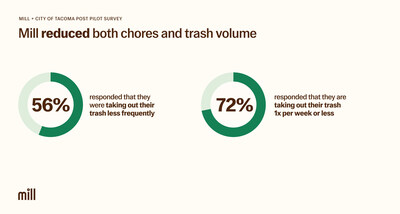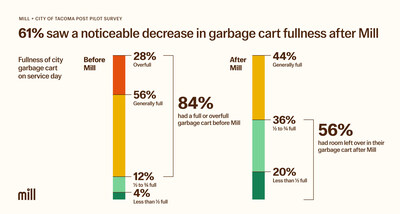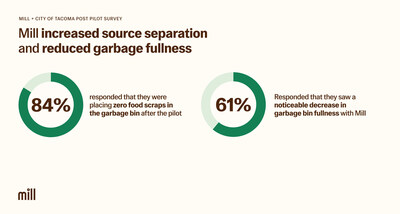Results demonstrate that Mill's food-recycling
technology can increase per-household organics diversion rates
while helping help people save time and money
SAN
BRUNO, Calif., July 18,
2024 /PRNewswire/ -- Award-winning
food-recycling system Mill today announced new results from
the company's year-long pilot with the City of Tacoma, Washington. The results show
that Mill increases food scrap source separation both in households
that have previously participated in municipal food scraps
collection and those that have not, and offers an easy way for
Tacoma residents to enjoy a better
kitchen experience, save on their waste and grocery bills, and
prevent harmful methane emissions.

In February 2023, Mill and the
City of Tacoma announced a
first-of-its-kind agreement to pilot a new strategy for using
connected in-home food recycling infrastructure to address
residential food waste diversion. The goals of the pilot were to
determine if Mill's food recycling technology could increase
citizen participation in food scraps source separation efforts,
reduce contamination in the waste stream, and offer a new
opportunity for residential customers to reduce the volume and
price of their waste service by separating food scraps out of the
waste stream.
Results: Increased Per-Household Food Scrap
Source Separation
- Mill participants in the Tacoma pilot source separated ten times more
food scraps than the average Tacoma household1.
- 84% of respondents to a post-pilot survey reported putting
zero food scraps into the trash after having Mill at
home.
- Over half of respondents had not previously used the City's
food scraps collection service, indicating that Mill is improving
both the quality and quantity of citizen participation in food
scrap source separation efforts.
Results: Reduction in Garbage Cart Volume,
with Time and Cost-Saving Implications
- Prior to Mill, 84% of respondents reported their garbage cart
was generally full or overfull. After having Mill, zero
respondents reported having an overfull garbage cart, and over half
(56%) reported room to spare.
- These results indicate that Mill is reducing the amount of food
that ends up in the trash, and offers new opportunities for people
living in pay-as-you-throw jurisdictions to save money on their
monthly waste bill.
- Most surveyed households also saw a reduction in household
chores: 56% reported they were taking the trash out less
frequently, and 72% responded they were taking the garbage out once
a week or less.
"The diversion numbers for the Mill pilot are impressive, and
the technology has been generally effective in addressing the ick
factor for residential customers who want to divert food waste, and
have a willingness to pay for the service. We are interested in
exploring ways that this type of technology can fit into our
overall menu of solid waste services," said
Lewis Griffith, Solid Waste
Division Manager, City of Tacoma.
Economic and Environmental Implications for
Consumers and Municipalities
Results from Mill's pilot with the City of Tacoma reinforce insights from Mill's
inaugural data report, which demonstrated that Mill is increasing
awareness of food waste and changing behavior in a sustained way,
and presenting new opportunities for people to save money and
reduce waste. Coupled with the finding based on over two million
days of device data that Mill customers nationwide decreased the
overall amount of wasted food they produce by over 20% over the
first four months of use, the economic implications are
significant: a Mill Tacoma customer could save $320 downsizing the size of their garbage cart,
and save at least $380 annually
through a 20% reduction in wasted food.2
The results from Mill's first municipal pilot have implications
for government leaders across the country seeking proven,
readily-deployable, cost-effective technology solutions that are
compatible with existing municipal infrastructure to increase food
waste diversion efforts in their communities. Mill's insights can
be leveraged at the community level to help local leaders
understand and influence the unique challenges of organics
collection, and make more informed procurement decisions.
"Participation and contamination are the Achilles' heel of
organics collection programs. This data demonstrates the type of
breakthrough in overcoming the ick factor that this industry has
been waiting for," said Scott
Smithline, Policy at Mill and Former Director of
CalRecycle.
Background on Mill and City of Tacoma
Pilot
The City of Tacoma, Washington
is one of the most forward-leaning municipalities in the United States committed to tackling food
waste. The City began collecting and recycling residential food
waste in 2012—since then, diverting up to 1,000 tons per year of
compostable food waste from landfills.3
The City of Tacoma operates
under a pay-as-you-throw waste structure, which means residents pay
based on the size of their garbage cart. The most popular option in
Tacoma is the 60-gallon garbage
cart collected every other week, which costs $53.47 per month. The smallest option, a
30-gallon garbage cart collected every other week, costs
$26.77 per month. By opting to
downsize their garbage container, residents could save up to
$26.70 per month on their waste
bill.
Participants in the Tacoma
pilot were self-selected, and the costs for Mill's food-recycling
system were paid by participating households.
Mill's food recycling system from Nest Cofounder Matt Rogers and
early Nest leader Harry Tannenbaum
turns household food scraps into clean, dry grounds that can feed
farms or gardens. Built by engineers from Apple and Google, Mill's
food recycler is sensitive to food scrap inputs as small as 15
grams—the equivalent of a single strawberry—which means Mill has a
precise understanding of how much food is being added to its fleet
of connected food-recyclers. This means that households across the
country have real-time visibility into how much food they're
wasting, and can act on it.
To learn more about how Mill can help your community,
visit mill.com/municipalities.
About Mill Industries Inc. ("Mill")
Mill makes it easy
to prevent food waste at home with an innovative new kitchen
experience and pathways that keep food out of landfills. Food isn't
trash. Together, we can do better.
Mill was founded in 2020 by Matt
Rogers and Harry Tannenbaum,
who worked together at Nest, building the iconic Nest Learning
Thermostat and other smart home products. The lessons they learned
about encouraging new habits at home that are good for people and
the planet were applied in creating Mill to change our perception
of waste, starting in the kitchen.
Mill is a trademark of Mill Industries Inc.
Follow Mill: Instagram and Facebook
1 Mill pilot households (84 total) represented about
0.1% of total City of Tacoma
households (89,228) and processed a total of 12 tons of food scraps
(approximately 1% of the City's total organics source-separated and
collected based on 2015 data). If the City of Tacoma's total tonnage of food scraps
collected (1204 tons) was attributed evenly across every household
in Tacoma, this would represent a
10X increase in per-household diversion rates in homes that had
Mill compared to homes that did not.
2 This calculation assumes 2.5 persons/household
according to 2022 US Census Bureau; Bureau of Labor Statistics and
2022 data from ReFED that the average American spends $759 on food that goes uneaten:
https://refed.org/food-waste/consumer-food-waste. That adds up to
the average American family wasting almost $1,900 per year on wasted food, and a 20%
reduction could save households at least $380 per year. By downsizing from a 60-gallon
cart to a 30-gallon cart, Tacoma
residents could save $320 per
year.
3 The City of Tacoma
collected 26,046 tons of organics through the single-family
curbside collection program in 2015. 1,204 tons were classified
as food waste, vegetative and other food waste.
Source (pg 70):
https://cms.cityoftacoma.org/SolidWaste/SMMP%202016_ExecSumm%20Vol%20123_FullReport.pdf


 View original content to download
multimedia:https://www.prnewswire.com/news-releases/mill-releases-results-of-year-long-food-recycling-pilot-with-city-of-tacoma-302199770.html
View original content to download
multimedia:https://www.prnewswire.com/news-releases/mill-releases-results-of-year-long-food-recycling-pilot-with-city-of-tacoma-302199770.html
SOURCE Mill Industries Inc.